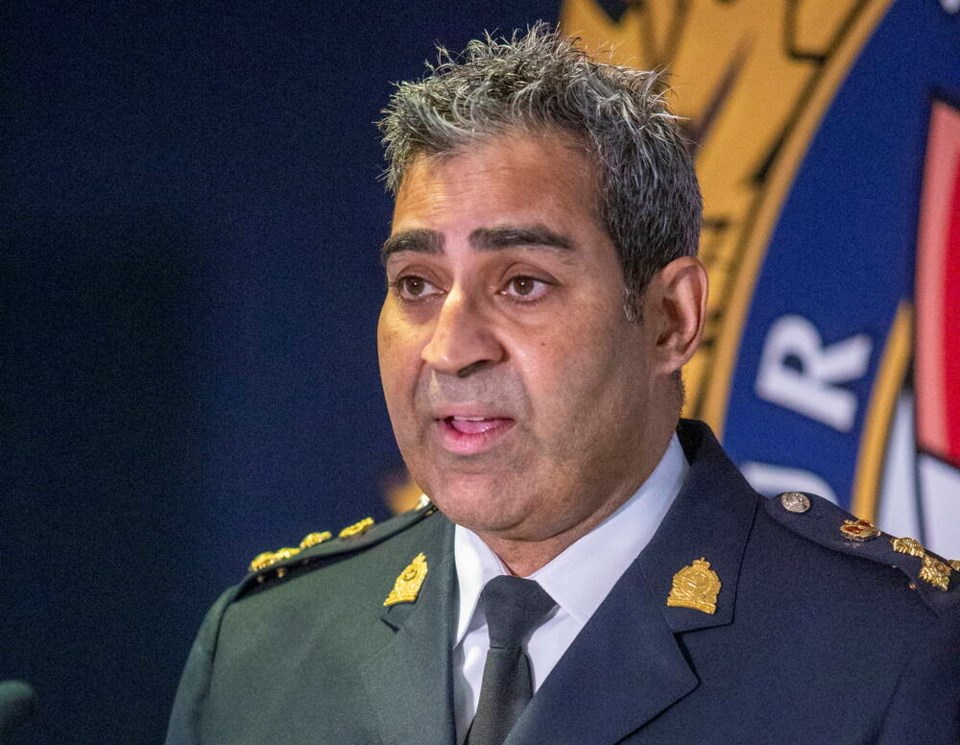Still reeling from having his $63.4-million budget rejected this week by Esquimalt council, Victoria Police Chief Del Manak said he is now concerned about establishing a two-tiered police service.
Manak said he was shocked and disappointed that Esquimalt, which is responsible for just under 14 per cent of the budget in its partnership agreement with Victoria, would not back the budget, especially as it had indicated it understood the need for additional personnel.
While Esquimalt approved the core police budget, it did not approve funding for 10 new personnel — four civilian positions and two officers for the Assertive Community Treatment team, two officers who would be part of a co-responder team with Island Health, a cultural liaison officer and a sergeant to work on cybercrime.
Victoria’s council approved the police core budget, as well as the $1-million funding request for the new positions.
The department requested a budget of $63.4 million, up from the 2021 budget of $59.2 million.
In an interview Wednesday, Manak said the situation leaves him with difficult decisions.
He noted the health authority, for example, has adjusted its budget to provide two registered psychiatric nurses to partner with two police officers as part of a co-response team.
“So how do I operationalize it. What do I do now?” Manak said.
“Esquimalt is now saying: ‘Well, we don’t support that’ so do I go ahead with it? What do I do if somebody is in mental health crisis in Esquimalt? Do they not have access to that team? Because really, technically, if Esquimalt is not paying and funding a team that provides mental-health response and service, I can’t technically be giving them a service for free,” he said.
“So we’re creating a two-tiered system. You would get a different level of service if you are an Esquimalt resident versus a Victoria resident.”
Manak said if they don’t go ahead and Island Health then repurposes the mental-health resources, the police department could lose out on an important opportunity.
Esquimalt Mayor Barb Desjardins agreed Victoria needs the extra resources. As vice-chair of the Victoria- Esquimalt Police Board, she supported the budget. However, she said when she returns to the council table she is duty-bound to represent Esquimalt, a township that she says has more police resources than it needs.
Manak said he is still surprised at Esquimalt’s decision, especially after the council supported the addition of Assertive Community Treatment officers, indicated support for a cultural liaison officer and seemed to understand that cybercrime is increasing in the entire region.
“For Esquimalt to not support the budget is a bit shocking, to be honest,” he said.
Manak said he respects Esquimalt’s position, even if he doesn’t agree with it.
“They have a tough job. They have to make decisions on where they’re going to allocate their budget and what they’re going to set as a priority,” he said.
“I just wish that public safety was a priority, that they would recognize that our request for 10 staff are needed staff, are staff that are needed for the Victoria Police Department to provide effective and adequate policing to the township.”
The Victoria City Police Union expressed its disappointment with the decision, saying it will further hamper efforts to improve staffing levels while affecting efforts to provide relief for existing officers.
“We are disappointed in the township, who repeatedly say they support our members. This vote is a blow to the morale of many officers who are dedicated in their service to both communities,” said union president Len Hollingsworth.
He said the department is in crisis and the current staff levels cannot continue to effectively police the increasing number of protests, extensive shelter beds and numerous other issues in the region.
“In short, we do not have the resources to continue to effectively police this amazing city,” he said, adding it’s time the province fixed the problem it created in 2003 when it forced Victoria and Esquimalt into a policing partnership.
Victoria Mayor Lisa Helps said she, too, was disappointed with Esquimalt’s position.
“There are definitely issues about the amalgamated policing of Victoria and Esquimalt, and I think we need to work with government to sort those out,” she said. “In the meantime, VicPD needs resources to do their job this year.”
She ruled out Victoria paying for the shortfall, noting there’s a budget allocation formula that has been imposed by the province that requires resources be funded by Victoria to the tune of close to 87 per cent and Esquimalt the balance.
Helps said the next steps will likely be to ask the province to review the situation and make a ruling. But her preference would be to see a regional police department.
Manak said the next step will be a police board meeting in two weeks to discuss options, which could include doing nothing, finding funding somewhere or seeking a review with the province, which last time took 16 months to complete.
“I feel that the officers and staff of the Victoria Police Department are caught in the middle,” Manak said. “They just want to provide quality policing to both the township and the city.”
The Police Framework Agreement, which governs the Victoria and Esquimalt amalgamated service delivery, is up for renewal this summer. Esquimalt has been clear it is unhappy with the arrangement, and Desjardins said it is engaging with the community to determine if it will renew the agreement.
aduffy@timescolonist.com



